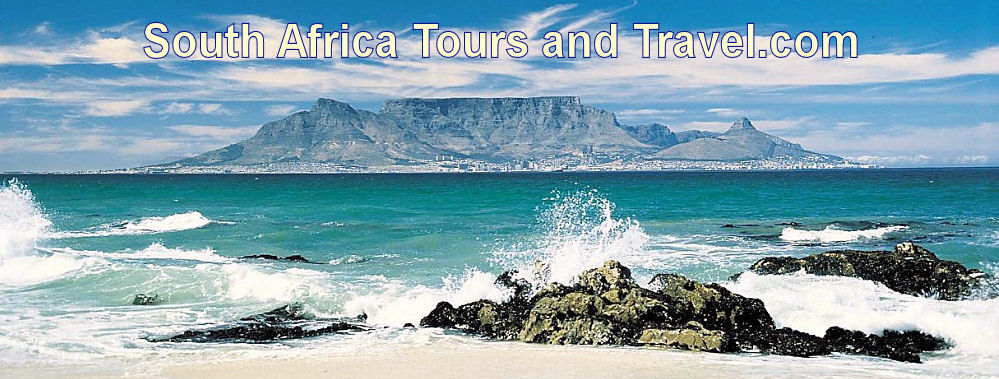You are here:
-
Home
›
-
Culture in South Africa
›
-
The People of South Africa
›
-
The Xhosa people
From small Xhosa tribe to
second largest nation in South Africa
The Xhosa tribe, amaXhosa in their language, also
belonged to the Nguni speaking tribes who moved into South Africa during the great southern
migration.
The very first Xhosa tribes arrived on the scene in South Africa in the 14th century,
spearheading the Great Southern Migration ahead of the Zulu tribes.
Originally they settled in the coastal region from the Mtamvuna river near Port St Johns in
KwaZulu-Natal to the Great Fish river in the Eastern cape.
The Xhosa speaking people can be divided into quite a few different tribes with related but
distinguishable heritages. The main subgroups are the Mpondo and the Thembu. Apart from them there
were a number of smaller tribes such as the Bomvana, Bhaca, Fingo, Nhlangwini and Xesibe.
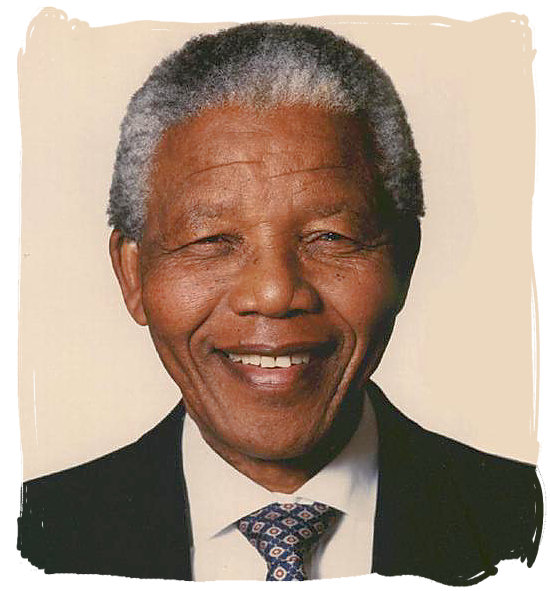
The legendary Nelson Mandela, a member of the Xhosa people and past President of South Africa.
Xhosa Tribe, Xhosa Language and Xhosa Culture in South Africa
There is some difference of opinion about the origin of the name "Xhosa". Some say that it was derived from the
name of one of their legendary leaders called uXhosa. Others say that the word xhosa comes from a word in the
San or Khoikhoi language that means "angry" or "fierce". The Xhosas describe themselves as the amaXhosa, meaning
"the fierce people".
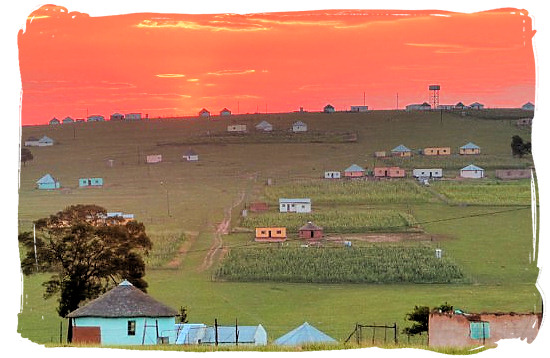
A present-days rural Xhosa settlement in the Eastern Cape provinc
Xhosa people, Xhosa Language and Xhosa Culture in South Africa
The Mfengu are also an important subgroup within the Xhosa nation. They evolved from what was left of the many
clans and chiefdoms that had been displaced in the course of the early nineteenth-century upheaval of the Mfecane.
These survivors of the mfecane, a period of widespread tribal wars and chaos from about 1815 to 1840, attached
themselves to Xhosa society, which was relatively stable on the circumstances.
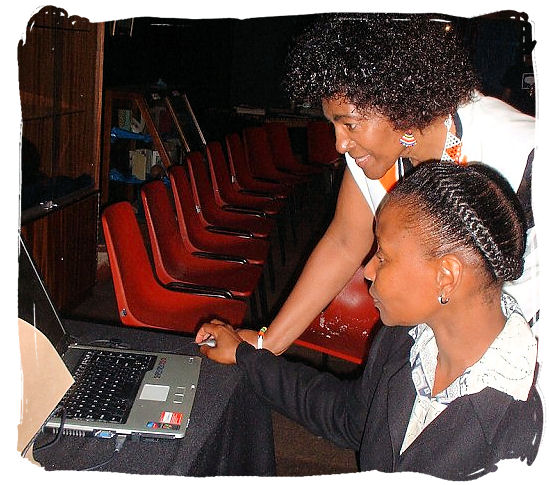
Two modern Xhosa ladies at work
Xhosa Tribe, Xhosa Language and Xhosa Culture in South Africa
Photograph by Dwaine Bailey
In their move south and westwards they first met with the indigenous Khoi people. There was not room for both of
them and soon clashes occurred between them on a regular basis. Eventually the Xhosas completely destroyed or
incorporated the Khoikhoi chiefdoms and the San nomadic clans in the region.
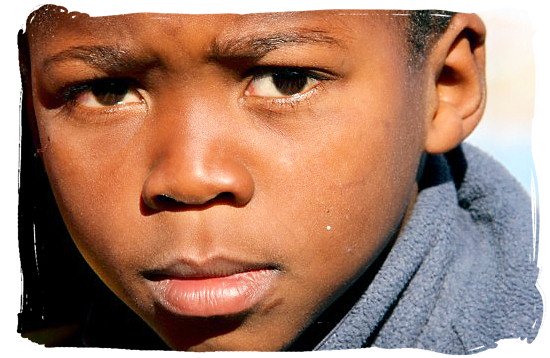
Young Xhosa boy
Xhosa Tribe, Xhosa Language and Xhosa Culture in South Africa
Photograph by Bianka Preusker
The incorporation of the Khoisan (Khoi and SAN) people into the Xhosa nation left its mark on the Xhosa language.
Because of its many "click" sounds the Xhosa language, or isiXhosa as they call it themselves, is different from
most other African languages.
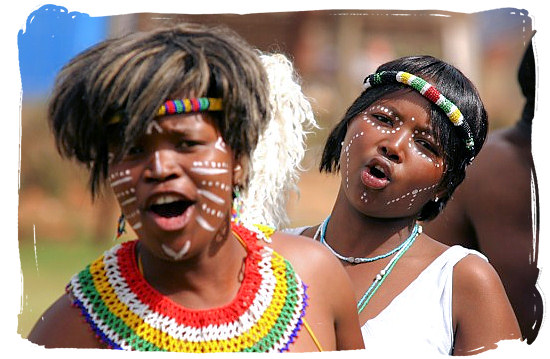
Singing and dancing, an important part of the Xhosa culture
Xhosa Tribe, Xhosa Language and Xhosa Culture in South Africa
Photograph by James Burton
The click consonant sounds are a typical and unique feature of the San and Khoikhoi languages. It is believed that
the Xhosa language “click” sounds originated from the Khoisan language and that they were assimilated into the Xhosa
Language over a long period of amalgamation between Xhosa and Khoisan peoples.
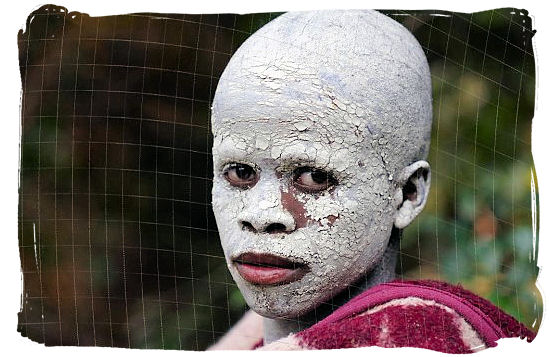
A Xhosa initiate, undergoing a manhood ritual, a secret rite taking them from boyhood to adulthood
Xhosa people, Xhosa Language and Xhosa Culture in South Africa
Photograph by Trevor Kelly
As the Xhosa people moved further south and west under pressure from the Zulus north-east of them, they met up with
white settlers from the Cape Colony for the first time in 1788 at the Great Fish river near Somerset East.
At that point in time, the Xhosa had inhabited the region near to the Fish River for already well over a hundred years.
So they found themselves in a squeeze between the Zulus from the east and the white settlers from the west.
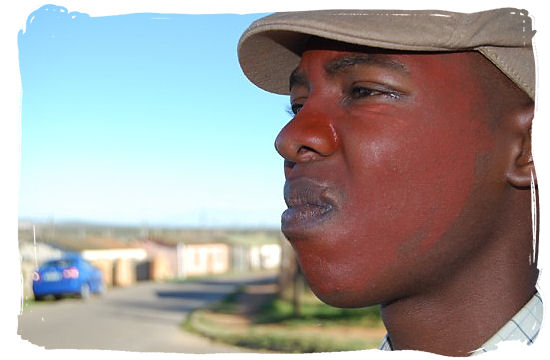
After initiates have passed into "manhood", they smear red clay on their faces to celebrate
Xhosa Tribe, Xhosa Language and Xhosa Culture in South Africa
Photograph by Trevor Kelly
This led to the historically well known nine Frontier Wars between 1779 and 1879 between the Xhosa people and the at
that time British authorities at the Cape Colony. After more than 20 years of intermittent conflict, the Xhosas were
expelled eastward from the district between the Great Fish river and the Sundays river by British colonial forces in
1811 during the Third Frontier War.
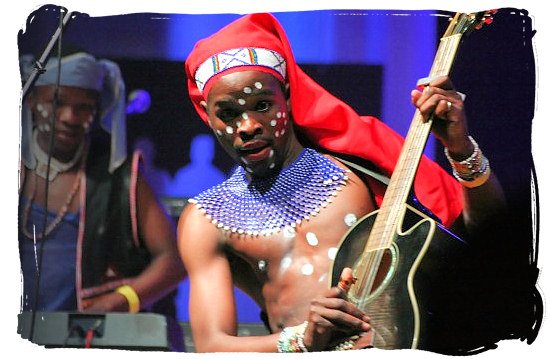
Young guitar player enjoying himself
Xhosa Tribe, Xhosa Language and Xhosa Culture in South Africa
Photograph by Max
This long and drawn out conflict situation was not so much a racial fight between white and black as a struggle for
survival in the form of grazing, water and living space between two groups of farmers.
This long and drawn out conflict situation was not so much a racial fight between white and black as being a struggle
for survival in the form of grazing, water and living space between two communities of farmers.
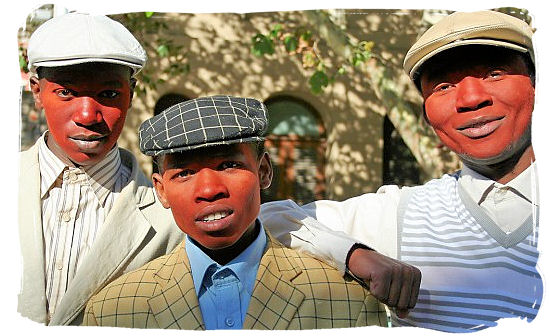
After initiates have passed into "manhood", they smear red clay on their faces to celebrate
Xhosa Tribe, Xhosa Language and Xhosa Culture in South Africa
The wars and white annexation, together with famines, political divisions and the cattle killing movement in 1856,
were responsible for the amaXhosa people's loss of most of their land and livestock. In the process, the Xhosas
became more and more poverty-stricken, and had virtually no choice but to become migrant laborers.
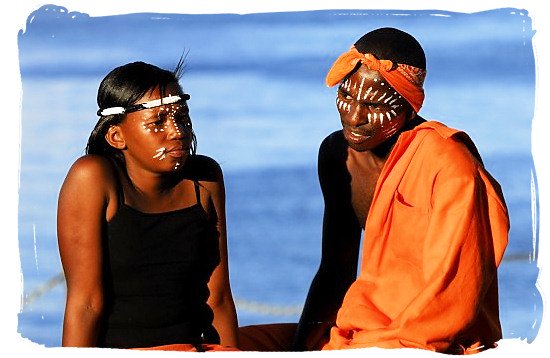
Traditional dancers taking a break
Xhosa people, Xhosa Language and Xhosa Culture in South Africa
It is said that the change from an agricultural lifestyle and economy to an industrial laborer and wage economy at this
stage in South Africa’s history, explains the long history of trade union membership and political leadership among
Xhosa people. This can be seen in the relatively high level of Xhosa representation in the top of the ANC, South
Africa's ruling political party.
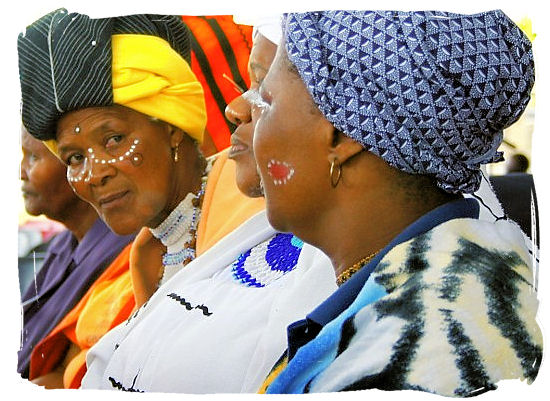
Xhosa ladies in traditional dress
Xhosa Tribe, Xhosa Language and Xhosa Culture in South Africa
Comprising approximately 8 million people, 18% of the total South African population, the amaXhosa (Xhosa nation) form
the second largest black nation in South Africa. It’s with the amaXhosa where the struggle for freedom from apartheid
had its roots world icons like Nelson Mandela and Steve Biko.
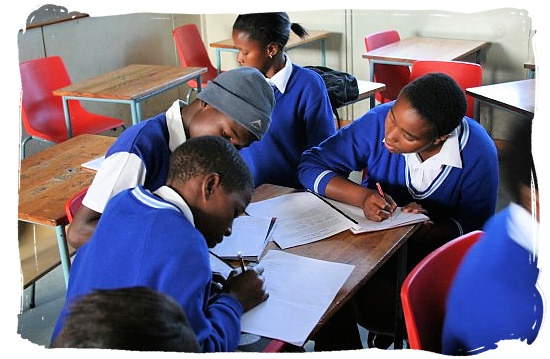
Young Xhosa students at work
Xhosa Tribe, Xhosa Language and Xhosa Culture in South Africa
copyright © SAEPCapeTown
Top of Page
-
Home
›
-
Culture in South Africa
›
-
The People of South Africa
›
-
The Xhosa people
